1964 – 2014 50th Jubilee:
Musings on the Beatles, Mississippi Freedom Summer and the Inherent Protest of the Blues
the Blues musings of TJ Wheeler, Blues musician and educator
It is time for reflection on the 50th commemoration of events of The Freedom Summer of 1964. Perhaps it might even be a muse for your own remembrances and even invoke a little action on current and connected issues such as voting this November.
Back then, as young boomers we were dealing with the effects of PTSD from the recent assassination of our nation’s youthful president, John F. Kennedy and the constant threat of the “Dr. Strangelove” like nuclear annihilation. Slowly, many of us were also realizing that liberty and justice for all was actually color, class, gender, ethnic and religiously coded, to really mean for some. There was also the increasing growth of a so called “Police Action” in Vietnam.
Somewhat surprisingly, 1964 brought a cathartic release with the February 4th launching of Beatlemaina; followed by a full scale British musical onslaught. After a half of decade of the increasing homogenization of American Rock & Roll, the British artists ironically turned us back to look at our own artists, the under recognized foundation of American Roots music and I mean specifically black American Blues. The absurd irony of my last point only increases the more I reflect on it.
There is another ironic, counterpoint, the juxtaposition of the growth of the generation of black and white culture that came to a head at that time. Acoustic forefathers like Son House & Bukka White and their electric Blues counterparts like Muddy Waters, Howling Wolf were seldom if ever allowed on commercial American national TV shows in 1964 (with the exception of the Rolling Stones insisting that Wolf be on Shindig with them). At that time, other black Pop & Motown acts were generally perceived as more refined, smooth, better dressed, dignified and would often get their chance on the big three (networks).
Generally speaking most of the demographic teen age groups seemed okay with those contradictions. Teen age blacks related more to the choreographed steps, high fashions, tight harmonies and overall sophistication of the Temptations or the Supremes; than the nitty gritty, in your face, no holds barred, emotional hard time reality sandwiches of a Magic Sam or Buddy Guy (let alone their predecessors). Many of them had been told for generations that Blues was just old slave music and even the Devil’s music. This attitude was impressed upon them not only by white leaders and institutions, but also by black ministers and many other prominent black community leaders.
Poet, writer and activist, Langston Hughes during the early 20th Century years of the Harlem Renaissance was criticized by some of his African American artist peers for his willingness to embrace the Blues. They thought the overall migration of southern blacks during the Great Migration and their Blues music was too primitive for their sophisticated self-image. Hughes countered their criticism, with a plethora of poems continued in the Blues and southern black influence, short stories and even musical plays. Needless to say, his work and point of view have stood the test of time and he’s viewed as a literary genius of the 20th century.
Young, middle class whites, on the other hand, that had grown up mostly in segregated urban areas, or in soulless suburbia. Frank Zappa would soon satirize them as having “TV dinners by the pool, I’m so glad I finished school.” For those white teens who craved something more real. They exalted rough edges, and dismissed the glossiness, velour veneer and blissful blandness of white Pop “muzack.” I include myself in that pack, we wanted to be rescued, from that “plastic, fantastic bubble” by the very thing that young blacks wanted to escape from…. the rough & tumble, but real, realities and authenticity of the Blues. What rescued whites, stereotyped blacks.
Black youth, who had grown up in a world where they would have to work twice as hard for half as much, wanted respect given for how they could artistically create performances that contained refinement without the sacrifice of soul and style or as it’s been coined today “a sense of swag.” Young white activists who had the advantages of respect and privilege of their skin color, forthrightly and defiantly rejected it (though it would always be there despite good intentions). The one thing both groups seemed to hold in common and seek was for the freedom to explore who they were, as opposed to who they were told they should be or who they were to grow up, to be. Again generally speaking, for one group that was more of an existential crisis and for the other it could literally mean the difference between life and death.
Later that year for several hundred of young whites and blacks the two seemingly inextricable paths would intersect for a radical experiment in seeking social justice. It was called Mississippi Freedom Summer. Though that movement had, relatively speaking, few in number, the events that took place during that summer of 1964 still reverberate today, as we commemorate its 50th Jubilee.
The baby boomer screams for the Beatles were soon better channeled by older, more mature, but idealistic, boomers into a period of both black and white protest music. Many of the younger boomers would soon follow in their footsteps. Such songs as Sam Cooke’s 1964 release of “A Change is going to Come,” Martha & the Vandella’s “Dancing in the Streets,” Curtis Mayfield & the Impressions “People Get Ready,” and “Keep on Pushing” as top 40 hits also served as anthems to our increasing youth mobilization into the civil rights movement.
College age white boomers, gravitated more to the acoustic protest songs of Pete Seeger, Peter, Paul & Mary, Joan Baez and their new leader Bob Dylan. Whatever genre of music they followed both groups of civil rights minded activists arrived by following the same common voice that had started all of the above musical styles, generations before them and that voice was the Blues.
How could one musical genre bring together such extreme divergent musical styles, let alone, cultures? I certainly won’t say simply but it was in part due to the fact that the Blues was at the foundation of so much of American music. The overlooked reality that the Blues, a music of many different holistic qualities, had always been music of protest. For that matter, the chosen music of the opposition (little did they know) whether that be Country & Western, homogenized Dixieland, or mainstream (non- Rock & Roll) conservative pop of the 40s and 50s had also all been influenced by the ubiquity of the Blues.
It is essential that I also highlight the importance of Gospel music as well as Jazz in setting up this inevitable, holy alliance and coming together of such varied backgrounds. They arguably both were, heavily influenced, if not derived out of the Blues. However Soul, Motown and a lot of R&B was far more influenced by these last two genres (especially Gospel) than by Chicago Blues. The continuum of Rev. Thomas Dorsey (formerly a Blues piano pumper for such icons as Ma Rainey and Tampa Red) to Mahalia Jackson & Sister Rosetta Tharpe, on down to Aretha Franklin, Pops Staple & the Staple Singers etc. After all the greatest black leaders in the five hundred year civil rights struggle have almost all been ministers or deacons in the church. Most of the Motown studio musicians were Jazz players, as were Ray Charles, BB King’s and T Bone Walker’s band members. Gospel, Jazz and their off spring all had coded, veiled meanings. In Blues it might say “Trouble in mind, I’m Blue” and in Gospel it might commiserate “I’m so glad trouble won’t last always” there was little doubt what the word trouble represented and who was dishing it out!
Speaking of real old school, work songs, field hollers, string band music as well spirituals which morphed into freedom songs of the Underground Railroad, had for hundreds of years prior to the advent of the Blues. They set the tone for protest as well as satire. But all the songs, regardless of type had to be coded for the simple sake of survival. The Blues continued the tradition. The late Alabama Bluesman Willie King told me at an International Blues Foundation conference in the mid – late 90s, in a discussion on the power of Blues in the Schools, he said that “every time you hear a Bluesman or Blueswoman talk about how their low down man (or woman) treated then so down and dirty you could replace the word man or woman with THE MAN. You hear what I’m saying?” One of the times I opened up for Big Daddy Kinsey, when we completely alone back stage, I asked him why do you always end your show with Muddy Water’s Manish Boy? Though it was just the two of us, he took no chances. Before he answered he looked over both his shoulders and then leaned down to where I was sitting and said in no more than a whisper “Because back in the bad old days we sang that song to ourselves to remind each other who we really were not, what we were told we were.” By the way, Manish Boy is listed in the Oxford American Magazine on Southern Culture in the top ten protest songs of all time. Alongside that anthem are two songs by J.B. Lenoir: “Down in Mississippi” and “Vietnam Blues.”
The major difference between the latter two songs and Manish Boy are that there is nothing coded, masked or even ambiguous about J.B’s lyrics. They are emboldened to the point of being highly inflammatory, in fact if they don’t scorch a burning in your soul; chances are you ain’t got one. From “Down in Mississippi:” “They had a hunting season, if they caught you…you went to jail. The season was always open on me, nobody needed no bail.” To me his most emotionally provocative song wasn’t listed which is “Born Dead.” The chorus strikes the listener sharper than an ice pick asking “Why was I born in Mississippi when it’s so hard to get ahead? (twice) Every black child born in Mississippi you know the poor child is born dead.”
The bulk of J.B’s unmasked protest Blues was recorded in the mid 60s in Germany (along with Willie Dixon) but because of its very protest nature it wasn’t released in the good old U.S. of A. until the early 1970s.
Though direct protest Blues were fairly rare, J.B. certainly wasn’t the first one to be so bold. Mr. Lenoir’s mentor, the prolific song writer Big Bill Broonzy, had broken through that wall when he recorded songs like “Yellow, Black, Brown” and “When Do I Get To Be Called a Man?” in the late 40s. These were not to be released right away. In fact it wasn’t ‘till the mid 50s about the time of Brown versus the Board of Education, when Sister Rosa Parks refused to give up her seat on that pivotal Montgomery, Alabama city bus, that they were finally made available to the public. One can also go back to Leadbelly’s “Bourgeois Blues” and to singers like Josh White, who dared to tackle the song that all others of that era left to Lady Day; Time Magazine’s song of the 20th century “Strange Fruit.”
An important link to both to both black & white baby boomers was Big Bill. That Bluesman had more reinvented lives than a cat. When Muddy, and later J.B. arrived in Chi town, Big Bill was not only an established act- he was the Man! As well as being a true Blues star, he paved the way for many emerging Chicago Blues acts that were transplants from the south. These young players were transitioning to the full, electric urban band sound that Big Bill had already been experimenting with himself (without the grit, drive and distortion of Muddy, Wolf, Little Walter etc.) That was just one of Big Bill’s Blues personas. He had ingratiated himself with the 40s leftist leaning Folk scene (although they wouldn’t allow him to play his arch top electric guitar at a Carnegie Hall folk concert in NYC. So much for tolerance!) Still, that opened up Bill to a brand new audience. Bill, John and Alan Lomax and the Seeger family opened up the folk music revival for other Blues artists, beginning Leadbelly, Josh White and Sonny Terry & Brownie McGhee. By the mid 60s most of the major Folk Blues players would be added to that circuit.
By 1963–1964 youthful black and white rebellions finally had intersected from their various musical, cultural and economic paths. In ‘63 Joan Baez & Bob Dylan alongside Gospel queen Mahalia Jackson and such leaders of the old Folk guard as Pete Seeger, all came and stood with Martin Luther King, Jr. and thousands upon thousands of supporters for the March on Washington.
Mississippi Freedom Summer was the vision of SNCC (Southern Non – Violent Coordinating Committee) worker Bob Moses and many other individuals and organizations such as the Council of Federated Organizations (COFO) which was a coalition of the Mississippi branches of the four major civil rights organizations CORE, The NAACP, SCLC and the afore mentioned SNNC. Roughly 700 College age white students coming mostly from the north, came to Mississippi to work primarily with young black activists to help disenfranchised blacks register to vote.
Technically blacks had the legal right to vote, but powerful racists circumvented such protections by insisting blacks take such things as a “citizens tests.” Only blacks had to answer obtuse questions that were convoluted, irrelevant, and which the young college educated students from the north couldn’t pass. Blacks also faced intense pressure often from their white employers, who threatened to fire them if the even attempted to register to vote. The Klan, fearing what they considered an invasion of northern agitators stepped up their beatings and intimidation of both local black citizens and the Freedom Summer volunteers. The assassinations of Goodman, Chaney & Schwerner on June 21, 1964 at the beginning of the Freedom Summer movement brought the harsh realities of the Jim Crow south to the international attention of the world. Their bodies were not found until August. Though a handful of defendants were eventually found guilty of violating the civil rights of the trio of civil rights workers (by killing them) no one served more than six years in prison. Not until the case was reopened in 2005 was a murderer convicted. Edgar Ray Killen was charged with three counts of murder, brought to trial and subsequently found guilty. It took 41 years for justice to be served! Killen, who by then was eighty received three 20 year sentences.
Other crimes committed during that time included the arrest of one thousand sixty two people, eighty Freedom Summer workers were beaten, thirty seven churches were bombed or burned, thirty black homes or businesses were bombed or burned, one other civil rights worked was killed in a head on collision, four people were critically wounded, and at least three Mississippi blacks were additionally murdered because of their support of the civil rights movement. Do to the severe backlash of the Jim Crow powers against the movement; few blacks actually were successfully registered. However do to the attention drawn to such violence, in 1965 Congress passed the federal Voting Rights Act. But local Mississippi lawmakers diluted the new law, and it would take ten more years and a ruling by the Supreme Court to insure that black voting would be a reality.
As we commemorate the 50th Jubilee of Mississippi Freedom Summer we must draw our attention to the voter suppression being conducted in 2014. Old Jim Crow may have traded his sheets in for an Armani suit and Botox injections to give the impression that he’s a new man, but he’s still the same old racist trying new divisive ways to segregate us mentally, and physically. He’s also doing his best to severely limit the constitutional rights of blacks and other voters. The laundry list of dirty tricks include the gerrymandering of voting districts, added voting requirements, the closing of voting halls, the limiting of days and hours that people are allowed to vote, new restriction on absentee ballots and on and on. To top it all off many people of all colors are feeling so discouraged and hopeless that they are giving up. In Fergusson, Missouri it was recently brought to my attention that only 25% of the black communities are registered to vote. To quote a new freedom song written by my Blues Core team at Grant Elementary school in Columbia, Missouri entitled “Freedom is a Slippery Slope” “Voting keeps people hoping. We can’t lose the rights of our hard earned fight” “Rosa rode the bus wouldn’t give up her seat, now it’s up to us and everybody we meet.”
Please everyone make sure your registered to vote for this coming November. The rights you save may be your own. Losing them, now that would REALLY BE THE BLUES!
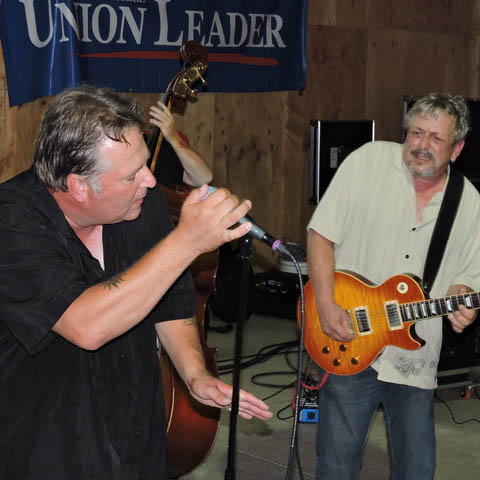

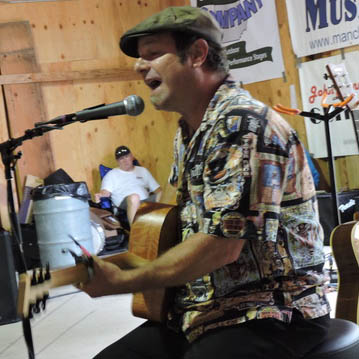


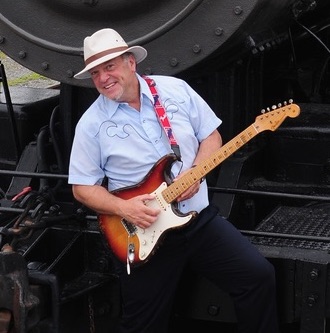
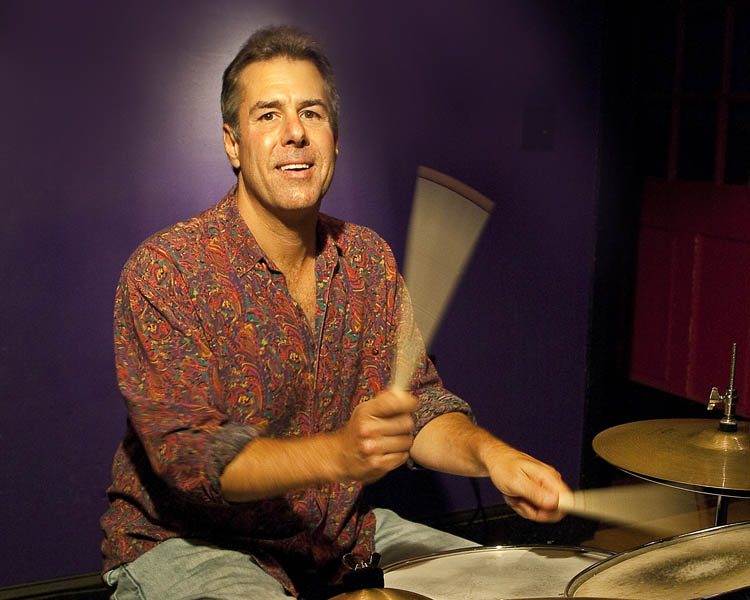
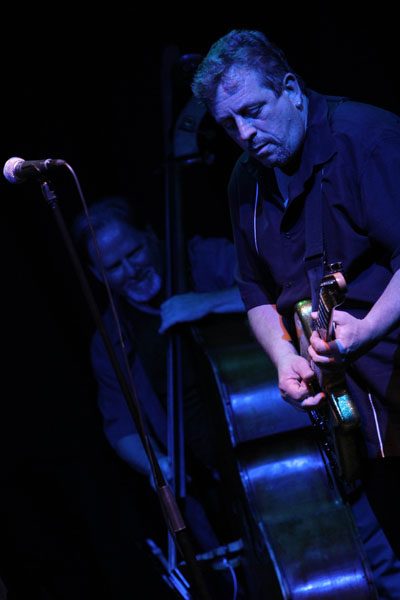
'’64 -’14 50th Freedom Summer Jubilee' has no comments
Be the first to comment this post!